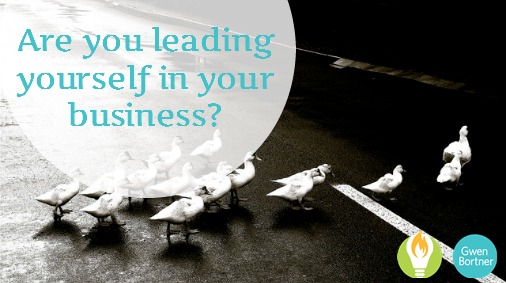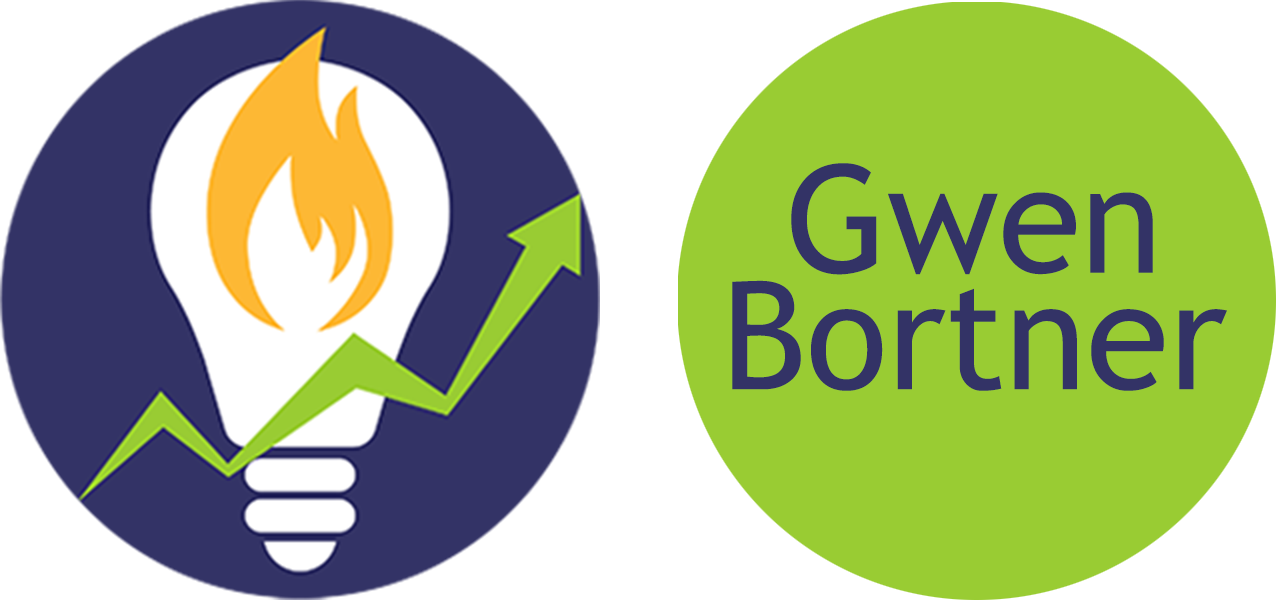
by Gwen Bortner | Leadership, Office Productivity
Most of us have probably been in a situation where we worked with a group of people, and the project went well or terribly depending on the quality of the group leadership. In your business, whether you’ve got a company of 100, 10, or 1 – YOU are the leader. What’s the quality of that group’s leadership?
Do you think of yourself as a leader? If you’ve got the title of entrepreneur, CEO, or “wearer of all the hats,” you’re leading your company. It doesn’t matter how many people work for you – if you’re not in the regular habit of leading yourself, you won’t be able to lead anyone else, now or in the future.
What steps are you taking to become a better leader in your business? Here are a few questions to ask yourself:
Are you prepared for each day?
Do you regularly take time in the morning (or at the close of working time the night before) to prepare for your day? Do you have a list of tasks and one to three goals you want to accomplish each day? Do you know what absolutely must be done, what would be nice to accomplish, and what can be left off the list?
If your answer is NO, then take some time to think and plan at the start of tomorrow’s work day, and every day after that. Give yourself a list of no more than 3 tasks that must be accomplished, and set an intention for how you want that day to go. Establish this as part of your morning routine, and stick with it! You’ll be surprised how much more productive you are throughout the day when you’ve got a clear plan.
Do you regularly seek to improve?
Nobody ever got really good at something if they didn’t regularly strive to improve their skills, and the same holds true for running a business. As the leader of your business, you’ve got to start with improving yourself, and you’ve got to keep up the habit regularly. Read more business blogs or books (and apply the lessons you’re learning!), participate in webinars and online classes, go out and attend conventions or other events. There’s a ton of education available out there to help you get better at whatever you’re trying to improve, from marketing to operations to profit. Pick something and start learning! Put it on your calendar so that you’re setting aside time each week to learn something new.
Do you ask for feedback?
How do you know you’re good at something? Someone tells you! (The same is true for knowing if you’re not so good!). You can give yourself feedback by setting up regular times to review what’s working and what’s not in your business (once a month for a quick review and once a quarter for a longer one is a good rule of thumb). At these same intervals, it’s a good idea to get outside feedback, from employees, contractors, business advisers, consultants, and customers. Create a survey, send a quick email, give them a form to fill out, and ask them what you’re doing well and what could be improved. Then, the all-important next step is to follow up and make changes according to the feedback you receive.
What’s the very next step YOU will take in order to lead yourself toward improving your business?

by Gwen Bortner | Training & Instruction
To be successful at most things, we have to be good learners. Unfortunately, as adults we have bought lies and falsehoods into our own minds that ultimately prevent us from achieving the best results.
I have spent the past 15 years focused almost exclusively on teaching and training adults in a variety of areas. From hobbies like knitting and skiing to “important” topics like business finance and project management, the challenges with adult learners are almost always the same.
As adults we struggle to learn new things, not because we’re incapable, but because we have bought into the lies that we continually perpetuate.
Lie #1 – Adults should be able to learn quickly.
This is based on the fact that we have experience and so we should be able to apply those experiences to new learning environment. To some degree this is true, but only if the experience actually applies to the new thing you’re learning.
Truth #1 – Children generally learn faster because learning is their full-time job.
Honestly, the most useful experience in learning quickly is continually going through the process of learning. People regularly engaged in learning new things generally learn faster than those who only try new experience occasionally. Being patient with yourself is critical to learning success; move past this lie by reminding yourself that you’re not going too slowly when you’re learning something new – you’re going at the pace that’s right for you. No matter how long it takes, if it’s worth learning then it’s worth taking your time with it.
Lie #2 – Adults shouldn’t need as much time to master new skills.
Once again, there is a grain of truth in this statement, but only if the person already has skills that are closely aligned with the new thing being learned. The reality is that the frustration of not achieving success in short order often hinders the learning process, thus extending the learning period. In other words, you are your own worst enemy in this area!
Truth #2 – Everyone requires practice, repetition, and effort when learning new skills.
Practice and repetition are the keys for every learning environment, no matter how old you are. Hearing it once, doing it once, looking at it once is never really going to be enough. Plan on investing the time to practice and improve any new skill, and the process will ultimately go more quickly. Another tip is to take good notes as you go through the process, so that you can follow those notes next time and help yourself learn more quickly!
Lie #3 – Adults can figure things out for themselves.
Although this can be true, it is rarely if ever the most effective mechanism for learning something new. Trial and error is a long standing method for solving problems in a pinch, but it is rarely the quickest or best alternative.
Truth #3 – Utilizing skilled instruction will shorten your learning curve and often provide insights you would not have discovered on your own.
Even when we work with education professionals, there will still be ample opportunity to struggle through challenges and “figure things out” for yourself. Hiring a professional instructor allows you to jump over a significant number of barriers early, so that you will find improvement and success more quickly. This allows you to focus on honing your skills instead of figuring out all the key elements on your own.
Lie #4 – Adults don’t really need to learn anything new.
If you don’t want to ever have anything change or improve in your world, this might be a true statement. But since the world around us is constantly changing, it is not really practical. If in no other area, technology is constantly changing and learning new things is the only way to keep up.
Truth #4 – To continue to be relevant, learning new things is a minimum requirement.
When we leave school we often think our learning days are over, but actually, they have just begun. The difference is not the requirement to learn, but the process and environment in which the learning takes place. Committing to be a life-long learner makes the process significantly easier (and generally makes you more interesting). Think of this time in your life as the opportunity to learn all the things they never taught you in school that you wish you knew, and to explore the topics that interest you or benefit you the most.
Lie #5 – Gaining new knowledge and understanding is all there is to learning.
Knowledge and understanding are critical to learning, but they are ultimately only the first step in the process. Knowledge in and of itself is useless; its true value comes in using it. Turn your knowledge into ACTION, and that’s where you’ll see the value.
Truth #5 – Real learning doesn’t happen until action takes place.
Without application of knowledge, the things you learn don’t have any real value. Just learning isn’t enough – the adventure begins when you DO something with all that knowledge.
Do you want to learn something new in 2017?
There are plenty of books out there that can help you improve your business, but sometimes it can be hard to sort through the sea of published volumes and find one that will work for YOUR business. Then, of course, there’s the trouble with keeping up with your reading and actually using what you’ve read to benefit your business!
That’s where my Small Biz Book Club comes in – sign up today and be notified once a month when I choose a new book to cover with the club members. You’ll have the option to sign up to participate in a read-along of that book, with actionable steps and apply-it-to-your-business notes to keep you going along the way! Enter your information into the form below to sign up.




